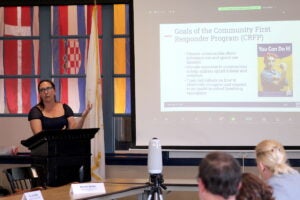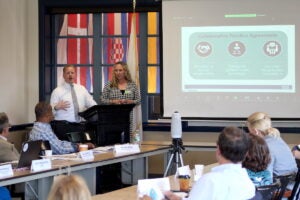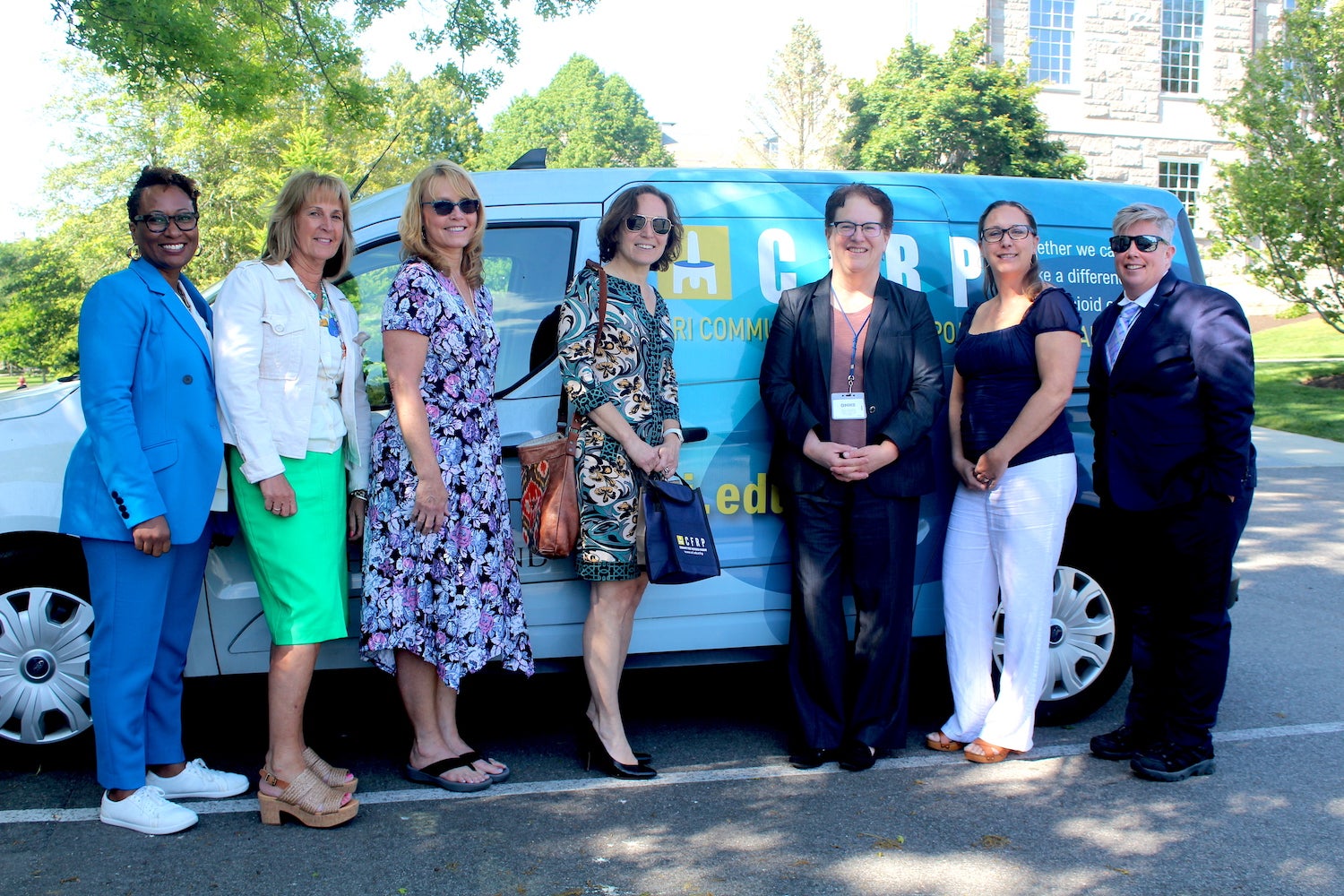URI’s Community First Responder Program among initiatives receiving funding from historic opioid provider settlement
The University of Rhode Island College of Pharmacy hosted Rhode Island’s Opioid Settlement Advisory Committee for its regular meeting and a tour of the centralized naloxone distribution site on the Kingston campus May 17.
The event highlighted an agreement with Teva Pharmaceuticals, Inc. that will provide 50,000 kits of life-saving Naloxone per year for 10 years as part of a $62.5 million opioid settlement with the state.
The naloxone kits will provide 100,000 doses a year of the nasal spray medication that can instantly reverse an opioid overdose. The free naloxone kits can be ordered through PreventOverdoseRI.org and URI’s Community First Responder Program, which has distributed thousands of life-saving Naloxone kits while educating members of the community about reversing opioid overdoses. The program has expanded to become the Northeast Rural Opioid Technical Assistance Regional Center for overdose response training across rural New England.
Residents can learn how to recognize and respond to an overdose using naloxone. The public is welcome to complete an interactive 10-minute online module to become a community first responder. The course includes the option to request a free naloxone kit by mail, which comes with two doses of naloxone nasal spray that can be dispensed directly into the nostrils of someone who is experiencing an overdose. Learn more and request a seminar here.

“Understanding how to recognize an overdose, and having these resources can help save lives when seconds are crucial,” said Anita Jacobson, clinical professor of pharmacy at URI and director of the first responder program. “Anyone who knows someone taking opioids for any reason, or using unregulated substances, such as stimulants, can be trained to recognize and respond to an overdose.”
In Rhode Island, residents can also get naloxone at any pharmacy without a prescription, and get a brief lesson from a pharmacist on its proper use. All health insurers in the state cover at least one type of generic naloxone with a no cost or low cost co-payment, and Medicaid fully covers the cost of generic naloxone.

Officials from the advisory committee also heard from URI Pharmacy Professor Jeffrey Bratberg and epidemiologist Traci Green about the increasing role pharmacists play in the battle against opioid use disorder. They showed that improving access to medications for opioid use disorder such as buprenorphine through pharmacists is a critical step.
Their first-of-its-kind study, published recently in the New England Journal of Medicine, documents the experience of 100 patients who started the medication buprenorphine by going to a specially trained pharmacist for their care. Once stabilized on the medication, 58 patients were randomized to receive either continued care in the pharmacy or more typical care in a clinic or physician’s office. After one month, the patients in the pharmacy group showed dramatically higher rates of retention in care: 89% continued in the pharmacy compared to just 17% in the usual care (physician or clinic) group.
The researchers visited addiction medicine specialists around the state to recruit patients, many of whom were not being adequately served by the health care community, and were not being treated for their opioid use disorder. Many participants were unemployed, unstably housed, or otherwise lacking access to care. The study gave them the opportunity to receive safe, convenient same-day treatment at times that were convenient for them, helping maintain their adherence to the program.
“This is a population that’s not being served that should be served, and this is one way we can help do that,” Bratberg said. “A great majority had already been on medication, and for whatever reason, couldn’t stay on treatment, largely because of the social determinants of health. Worldwide, this is the first time someone can walk into a pharmacy and get buprenorphine without a physician visit, expanding their access to care. We found patients who get started in the pharmacy really like that care, and they tend to stick with it. Compared to no care, it’s a dramatic difference in quality of life for them.”
The Opioid Settlement Advisory Committee continues to consider ways to use more than $90 million awarded to Rhode Island in the settlement with opioid manufacturers Teva, as well as Johnson & Johnson and consulting firm McKinsey & Co. The state has announced that all funds will be directed to opioid abatement – including expanding access to opioid use disorder prevention, intervention, treatment and recovery.

